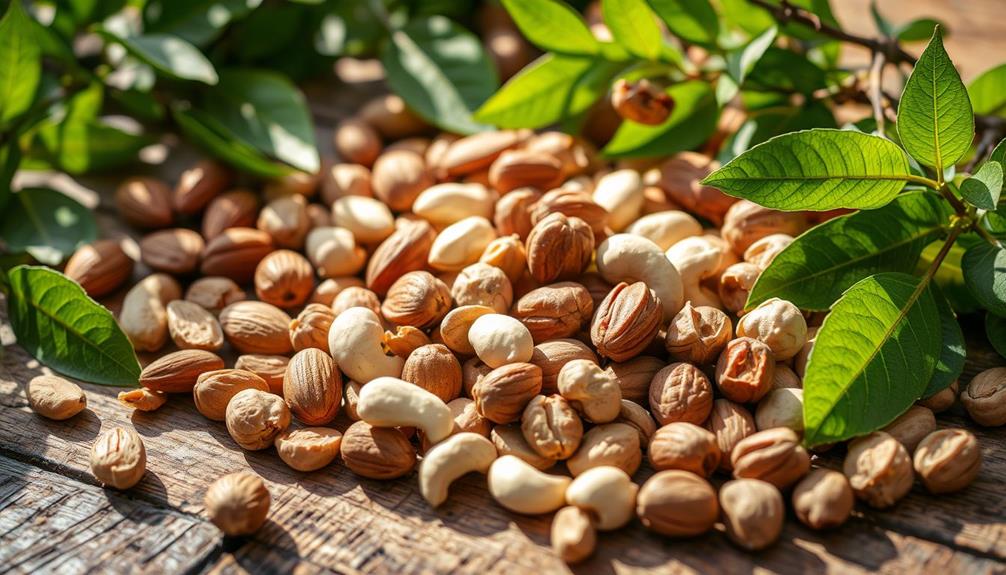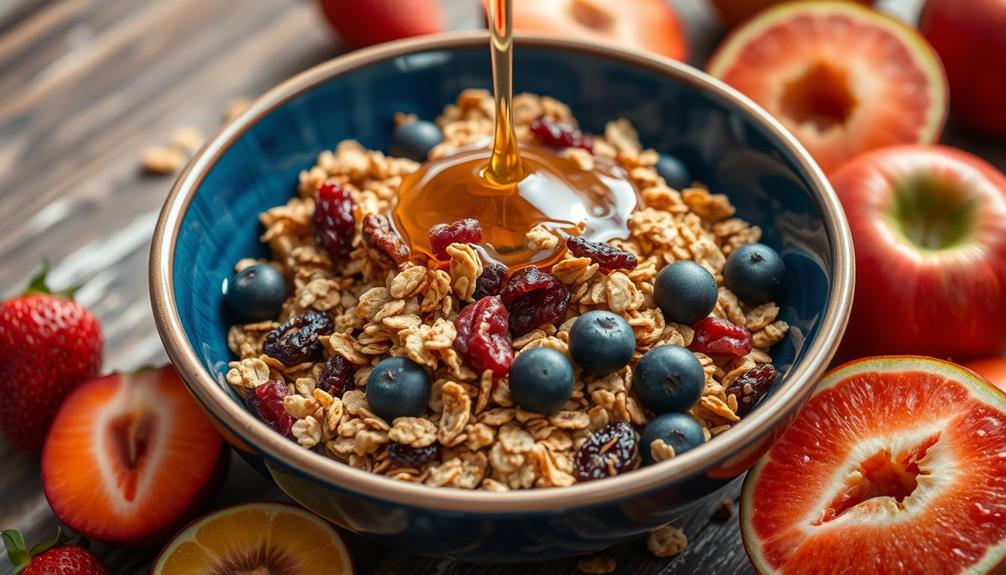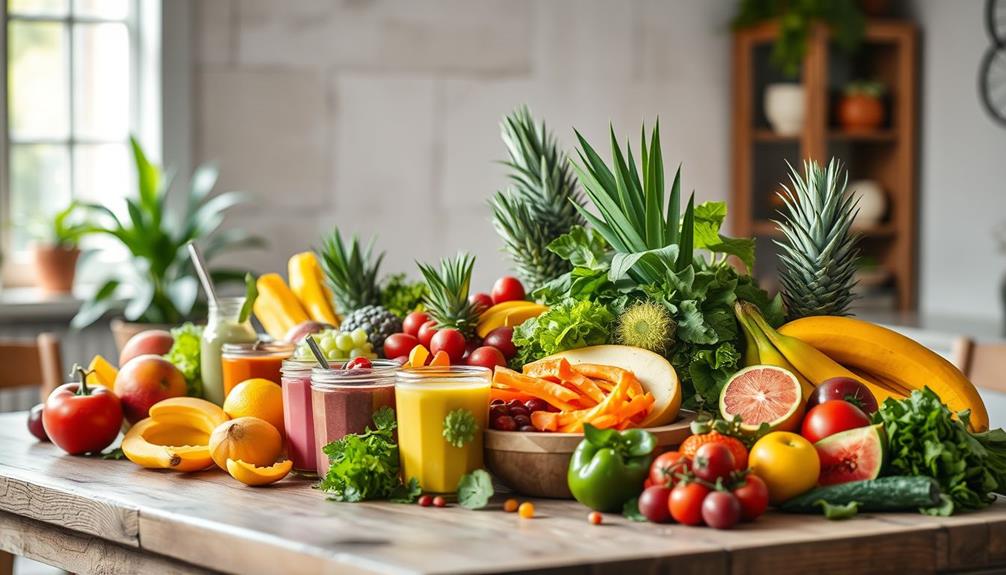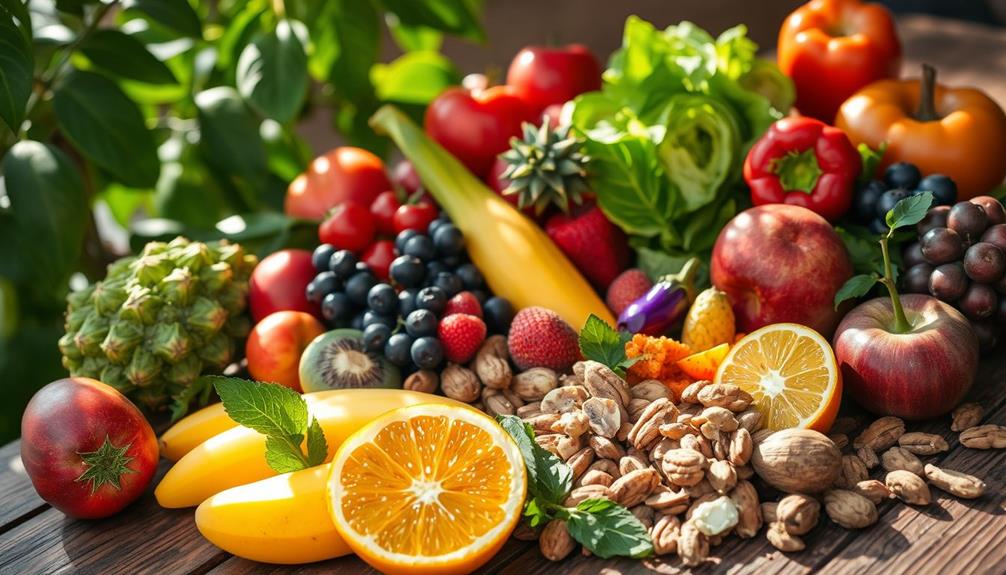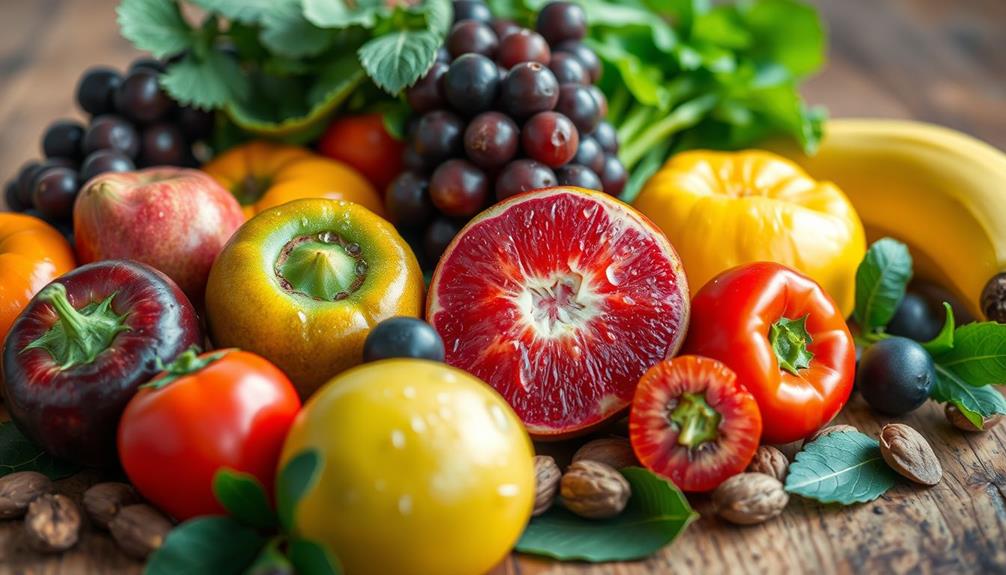Yes, nuts can be considered raw food, but it depends on their processing. For them to qualify as raw, they must be unsalted, unroasted, and kept below 104-118°F during processing. Many commercially available nuts undergo pasteurization or heating, which alters their raw status. To guarantee you're getting true raw nuts, look for products labeled "raw" or "unpasteurized" and buy from reputable suppliers. Remember, while raw nuts are nutrient-dense and offer various health benefits, they can also harbor anti-nutrients that affect digestion. Stick around to uncover more about selecting and preparing your nuts effectively!
Key Takeaways
- Raw nuts are defined as unsalted, unroasted, and unprocessed, typically heated below 104-118°F to preserve nutrients.
- Many commercially available nuts undergo pasteurization, affecting their raw status; look for "raw" or "unpasteurized" labels.
- Soaking raw nuts can enhance digestibility and nutrient absorption by neutralizing anti-nutrients like phytic acid.
- Certain nut varieties, such as almonds, are frequently subject to heat treatment, limiting their classification as raw food.
- Careful sourcing from reputable suppliers ensures the true raw status of nuts, avoiding cross-contamination and processing issues.
Definition of Raw Nuts
When you think about raw nuts, it's vital to understand that they're typically unsalted, unroasted, and unprocessed, meaning they haven't been exposed to heat above 104-118°F (40-48°C). This low heat exposure helps preserve their natural enzymes and nutrients, allowing you to enjoy the full health benefits of these delicious snacks.
Additionally, incorporating gout-friendly foods into your diet can complement the nutritional value of raw nuts, especially for those managing uric acid levels. However, not all nuts labeled as raw are genuinely unprocessed. Many commercially available options undergo pasteurization or heat treatment to eliminate harmful bacteria, which compromises their raw status.
To guarantee you're getting true raw nuts, consider sourcing them directly from specific growers or reliable online suppliers who offer unprocessed varieties. It's also essential to verify the raw status of any nuts you purchase, as cleaning methods like steam washing can expose them to heat, further disqualifying them as raw.
For an even better experience, soaking raw nuts before consumption can enhance their digestibility and nutrient absorption, making them a more beneficial choice. By being informed about the definition of raw nuts, you can make healthier decisions that align with your dietary preferences.
Nutritional Value of Raw Nuts
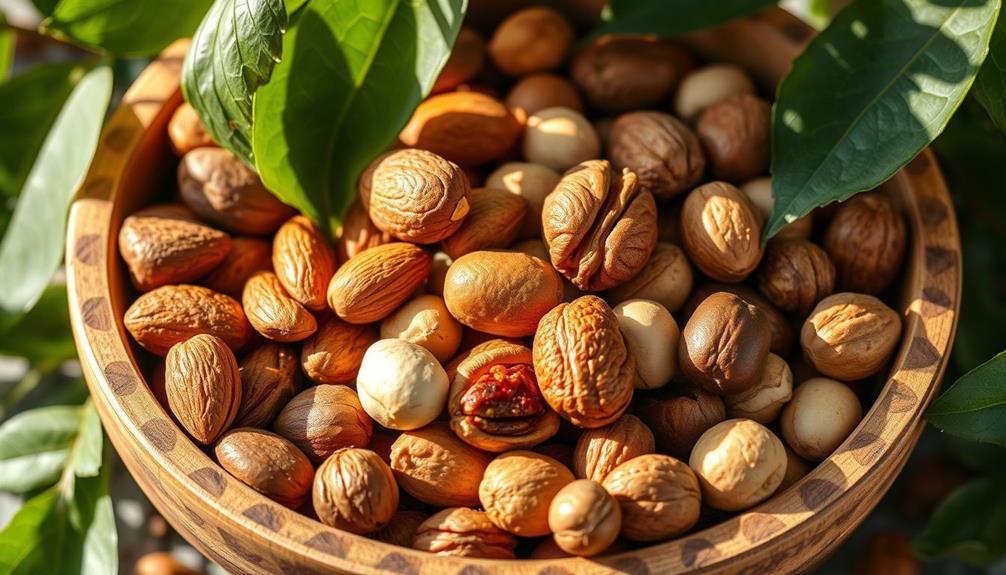
When you compare the nutrient density of raw nuts to other snacks, you'll see they pack a powerful punch of protein, healthy fats, and essential vitamins.
Their health benefits extend beyond just being a tasty treat, as they can help reduce inflammation and support heart health. Additionally, raw nuts are rich in antioxidants, which can contribute to overall well-being and may even support kidney stone prevention.
Plus, soaking raw nuts can improve their digestibility, making it easier for your body to absorb all those nutrients.
Nutrient Density Comparison
Nuts are a powerhouse of nutrients, making them an excellent choice for anyone looking to enhance their diet. Raw nuts are particularly nutrient-dense, offering a rich source of healthy fats, protein, fiber, vitamins, and minerals. For instance, just 1 oz of raw almonds packs 161 calories and 14g of fat, along with high levels of vitamin E and magnesium.
Butter is a source of vitamins that can complement a diet rich in nuts. Walnuts stand out for their omega-3 fatty acids and antioxidants, contributing to their impressive nutritional profile.
When you soak raw nuts, you enhance their digestibility and improve nutrient absorption, making them even more beneficial. Additionally, raw nuts retain higher levels of heat-sensitive nutrients, such as vitamin E, which often diminish during roasting processes.
The antioxidant properties found in raw nuts, like those in pecans and hazelnuts, can help reduce inflammation and support overall health.
Incorporating raw nuts into your diet is a simple way to boost your nutrient intake, providing you with a tasty and satisfying snack that offers a multitude of health benefits. So, next time you reach for a handful of nuts, consider going raw for maximum nutritional impact.
Health Benefits Overview
Raw nuts pack a powerful punch regarding health benefits, making them a fantastic addition to your diet. They're nutrient-dense, providing healthy fats, protein, fiber, vitamins, and minerals that contribute to overall health and keep you feeling full. For instance, raw almonds are rich in vitamin E and magnesium, while walnuts boast a great supply of omega-3 fatty acids, essential for heart health.
To help you understand the nutritional value of various raw nuts, here's a quick overview:
| Nut Type | Key Nutrients |
|---|---|
| Raw Almonds | Vitamin E, Magnesium |
| Walnuts | Omega-3 Fatty Acids |
| Cashews | Iron, Zinc |
| Pistachios | Potassium, Fiber |
Including these nuts in your balanced diet can also provide antioxidants that may help reduce inflammation and lower the risk of chronic diseases like heart disease, diabetes, and cancer. Just remember to practice portion control, as raw almonds contain about 161 calories per ounce. Enjoying nuts in moderation guarantees you reap the health benefits without overdoing it!
Digestibility and Absorption
For those looking to maximize the nutritional benefits of raw nuts, understanding their digestibility and absorption is essential. Raw nuts are packed with protein, healthy fats, and crucial nutrients, and their antioxidant properties may support heart health.
However, they also contain anti-nutrients that can hinder your body's ability to absorb these valuable components. To enhance digestibility and nutrient absorption, consider the following:
- Soaking raw nuts for 12-24 hours can neutralize anti-nutrients.
- Increased bioavailability of minerals occurs after soaking.
- The antioxidant properties of raw nuts support heart health.
- Herbal teas like chamomile may also complement a healthy diet by promoting relaxation and reducing stress.
- Moderation is key to managing caloric density.
Common Types of Nuts
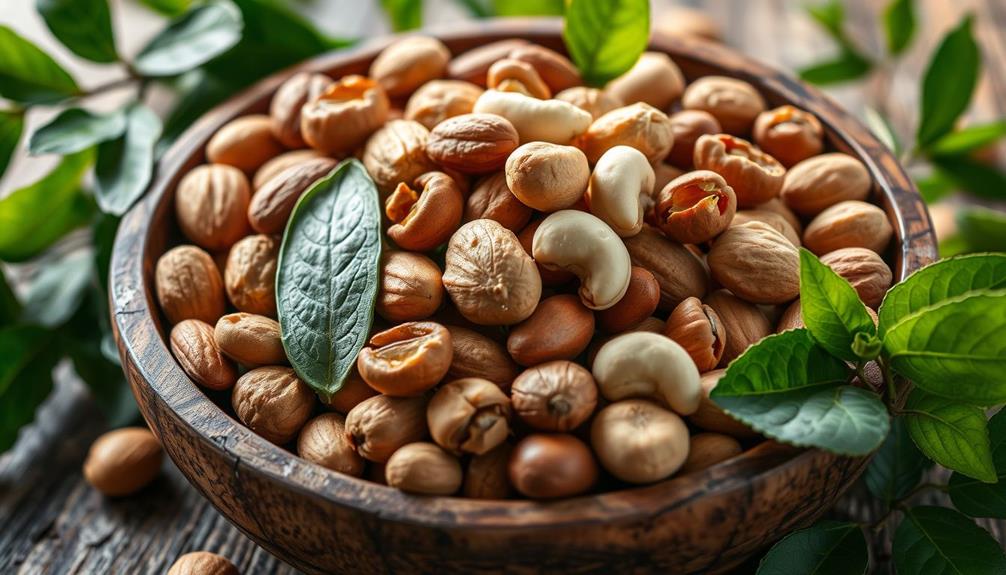
A variety of nuts offers a wealth of nutritional benefits, making them a popular choice for health-conscious individuals. If you're following a Raw Food Diet, you'll appreciate the unique advantages each type of nut provides. Incorporating nuts into your diet can also support effective strategies for weight loss, thanks to their healthy fats and protein content that promote satiety.
Almonds stand out for their high vitamin E and magnesium content, while walnuts are packed with omega-3 fatty acids, essential for heart health. Brazil nuts are an excellent source of selenium, which supports thyroid function, and cashews offer potassium and B vitamins for energy and metabolism.
Pecans are rich in antioxidants and healthy fats, aiding in managing cholesterol levels. Hazelnuts can help reduce cholesterol due to their protein and fiber content. Pine nuts are particularly beneficial for cardiovascular health, as they contain calcium and vitamins A, C, and D.
Finally, macadamia nuts provide palmitoleic acid, which supports fat metabolism.
Incorporating these nuts into your diet not only enhances flavor and texture but also boosts your overall health. So, whether you enjoy them as a snack or mixed into dishes, nuts are a versatile addition to any healthy lifestyle.
Raw Vs. Processed Nuts
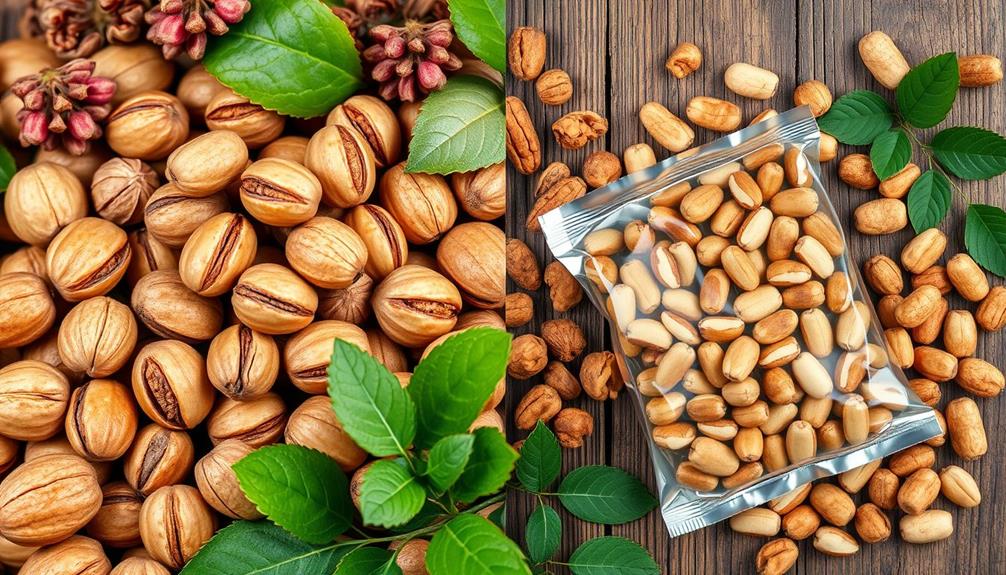
When it comes to nuts, understanding the distinction between raw and processed options is vital for health-conscious consumers. Most commercially available nuts in the U.S. are pasteurized or heat-treated, which means they may not qualify as truly raw. True raw nuts can often be found through specific growers or online sources, making it important to evaluate potential risks related to sourcing.
Here are some key points to reflect on:
- Unshelled nuts mightn't always be raw due to cleaning methods like steam washing.
- Legislation often affects the availability of raw nuts, with common varieties like almonds usually subjected to pasteurization.
- Many shelled nuts may have been boiled or steamed before they reach you, altering their raw status.
- Soaking nuts can enhance digestibility and nutrient absorption, regardless of whether they're raw or processed.
To guarantee you're getting the raw nuts you desire, it's vital to verify processing methods with growers. While the health benefits of raw nuts are often highlighted, being informed about the processing of your nuts can help you make better choices tailored to your dietary needs.
Health Benefits of Raw Nuts
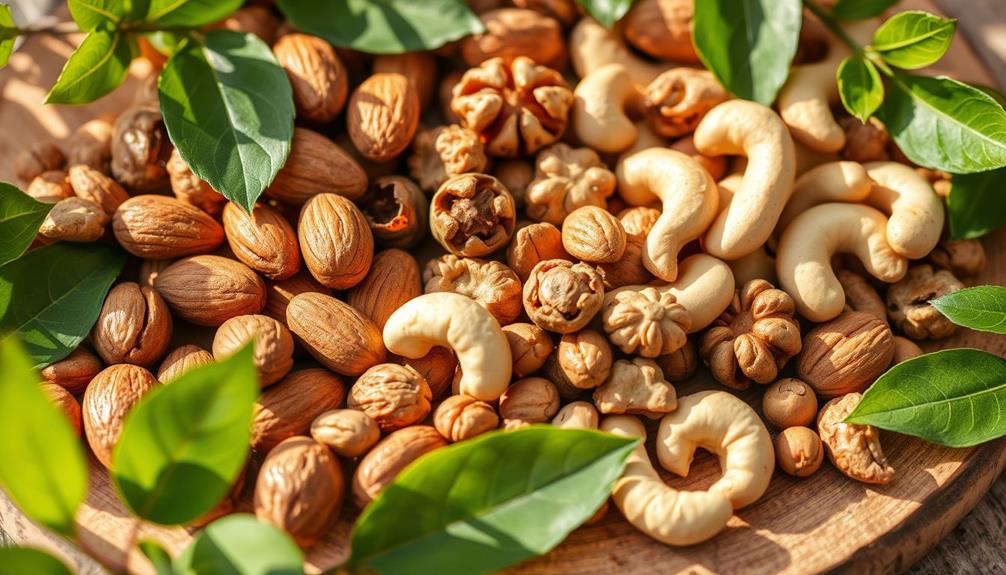
Raw nuts pack a powerful punch when it comes to nutrition, offering a wealth of health benefits that can enhance your overall well-being. These nutrient-dense snacks provide healthy fats, protein, fiber, vitamins, and minerals, helping you feel full and satisfied. Just a small serving, like one ounce of almonds, delivers 14 grams of fat and 6 grams of protein, making them a smart choice for snacking.
Additionally, incorporating raw nuts into your diet can support your savings goals, as they're a cost-effective and nutritious alternative to many processed snacks.
Research shows that nuts like almonds and walnuts can lower LDL cholesterol levels, greatly reducing your risk of chronic diseases, including heart disease and diabetes. Their high antioxidant content also helps combat inflammation, promoting heart health and overall wellness.
Soaking raw nuts can further enhance their digestibility and nutrient absorption, allowing you to reap even more of their benefits. By incorporating raw nuts into your daily diet, you not only enjoy a delicious snack but also take a proactive step toward better health.
Regular consumption can contribute to long-term health improvements, making raw nuts an essential addition to your nutrition plan. Embrace the health benefits of raw nuts and nourish your body with these wholesome treats!
Risks of Consuming Raw Nuts
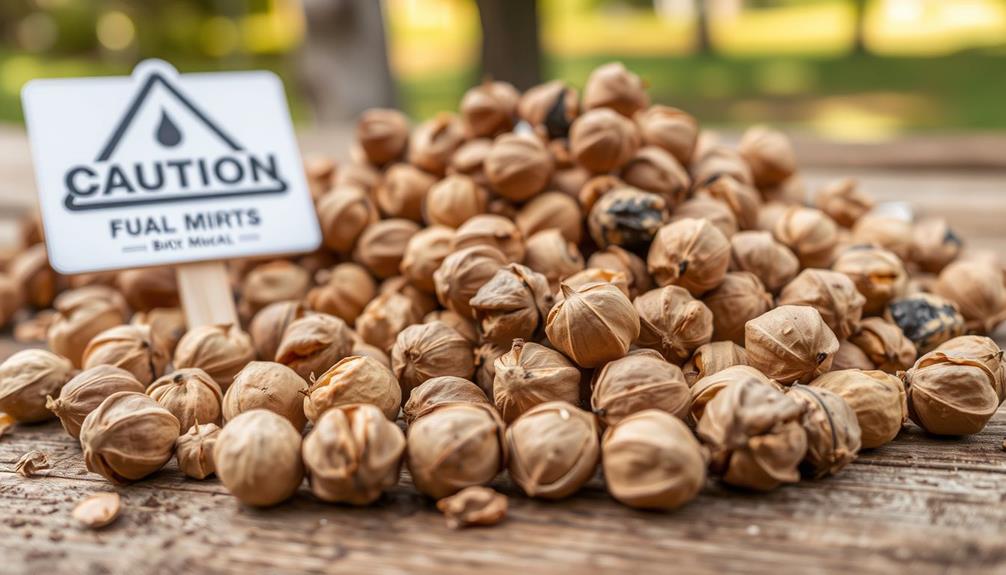
When you eat raw nuts, you might face risks like allergies and sensitivities that can trigger uncomfortable reactions.
Additionally, raw nuts can contain compounds that hinder nutrient absorption, impacting your overall health. It's crucial to be aware of these potential issues before making raw nuts a regular part of your diet.
Furthermore, some essential oils, such as eucalyptus oil, are known for their health benefits and can complement your diet, but they should be used wisely alongside raw foods.
Allergies and Sensitivities
Although many people enjoy the health benefits of raw nuts, it's important to be aware of the potential risks, especially if you have allergies or sensitivities. Nut allergies are among the most common food allergies, affecting about 1-2% of the population. Reactions can range from mild symptoms to severe anaphylaxis.
Additionally, certain dog breeds may also have sensitivities to nuts, so it's wise to be cautious with any treats you share with your pets, especially those that might include healthy dog snacks.
Here are some key points to keep in mind:
- Symptoms can include hives, swelling, gastrointestinal issues, and respiratory problems.
- Reactions may occur within minutes of exposure, making it essential to be vigilant.
- Cross-contamination poses a significant risk; traces of nuts can be found in products that don't contain nuts.
- Some individuals may experience sensitivities to raw nuts due to their higher levels of anti-nutrients, which can irritate the digestive system.
If you have nut allergies, it's important to read labels carefully and consult healthcare professionals about safe consumption practices and emergency action plans.
Nutrient Absorption Issues
Nuts can be a nutritious addition to your diet, but consuming them raw may come with some nutrient absorption challenges. Raw nuts often contain anti-nutrients like phytic acid, which can inhibit the absorption of essential minerals such as zinc and iron. This means that while you're eating these nutrient-dense snacks, you mightn't be getting all the benefits you expect.
Additionally, individuals with certain conditions, such as BPD dynamics in relationships, may find their emotional responses influenced by dietary choices, including the consumption of raw nuts.
If you find that raw nuts lead to gastrointestinal discomfort, you're not alone. Some people experience digestive issues when they consume large quantities due to these anti-nutrients. To improve digestibility and nutrient absorption, consider soaking or sprouting your nuts. These methods can greatly reduce the levels of anti-nutrients, making nutrients more bioavailable and easier for your body to absorb.
Portion control is also essential. Since raw nuts are high in calories, overindulging can disrupt your overall nutrient absorption and lead to imbalances in your diet.
Preparing and Soaking Nuts

Soaking your nuts for 12-24 hours can considerably enhance their digestibility and nutrient absorption. This process reduces anti-nutrients that inhibit mineral absorption, making it easier for your body to benefit from the nutrients in nuts.
When preparing your nuts, don't forget to rinse them thoroughly after soaking to remove any remaining anti-nutritional compounds, which can also improve taste.
Consider these benefits of soaking:
- Improved digestion: Soaking reduces compounds that can hinder nutrient absorption.
- Enhanced texture: Softer nuts are more palatable and easier to blend in recipes.
- Versatile use: Soaked nuts work well in smoothies, nut milks, and desserts.
- Storage tips: Keep your soaked nuts in a cool, dry place to maintain freshness.
Different nuts require different soaking times. For example, almonds typically benefit from soaking, while cashews are often soaked to create creamy textures in dishes.
Environmental Impact of Nut Farming

When enjoying the benefits of soaked nuts, it's important to contemplate the environmental impact of their farming practices. Nut farming, particularly almond cultivation, consumes enormous water resources—about 1.1 million gallons of water per acre annually in California. This intensive water use raises sustainability concerns, especially in drought-prone areas.
Moreover, the expansion of nut plantations often leads to deforestation, contributing to habitat loss and reduced biodiversity. This means that the environmental impact of nut farming isn't just about resources; it also encompasses the ecosystems affected by these agricultural practices.
On a positive note, sustainable farming practices, such as organic farming and agroforestry, can help mitigate these issues by promoting soil health and cutting down on pesticide use. Additionally, sourcing nuts locally can considerably reduce transportation emissions, supporting local economies while minimizing the carbon footprint associated with shipping.
However, not all nuts are created equal. For instance, cashew production is often linked to labor exploitation and land degradation, emphasizing the importance of ethical sourcing.
Choosing Quality Raw Nuts
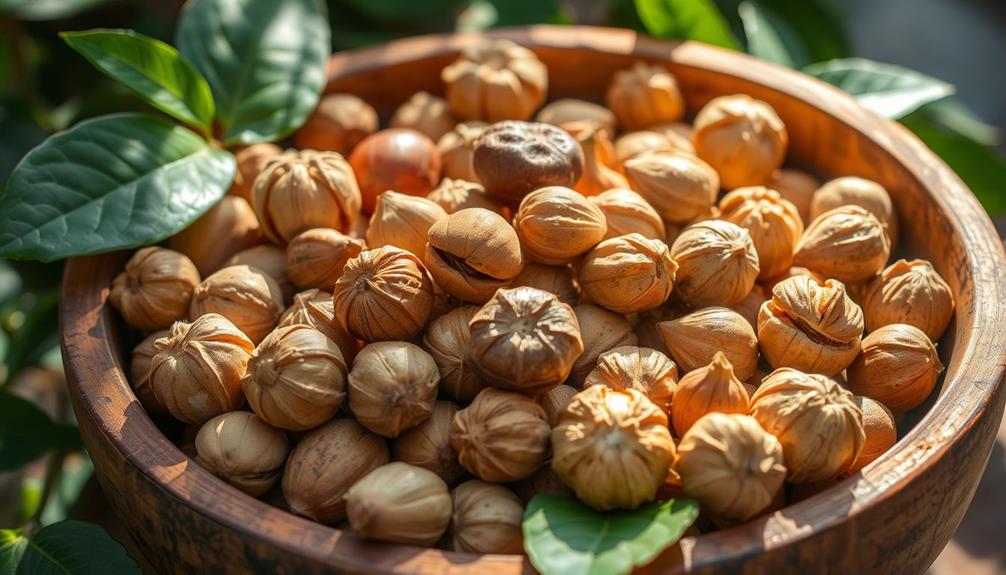
Selecting high-quality raw nuts is essential for maximizing both flavor and health benefits. When choosing your nuts, keep a few key factors in mind to guarantee you're getting the best:
- Look for certified organic products, which often indicate better quality and fewer harmful chemicals.
- Check packaging for "raw" or "unpasteurized" labels, as many commercially available nuts are pasteurized or heat-treated.
- Purchase directly from growers or reputable suppliers who clarify their processing methods to ensure you're getting truly raw nuts.
- Be cautious with unshelled nuts, as their cleaning methods may compromise their raw status.
Frequently Asked Questions
Are Nuts Considered Raw Food?
Nuts can be considered raw food if they're unprocessed and haven't been heated above 118°F. Check for certifications and consider sourcing directly from producers to guarantee you're getting truly raw varieties.
How Can You Tell if Nuts Are Raw?
To tell if nuts are raw, check for clear labels—look for "raw" or "unpasteurized." Also, consider sourcing from trusted suppliers, since processing methods can greatly affect their authenticity and taste.
Are Store Bought Nuts Raw?
Most store-bought nuts aren't raw since they're often pasteurized or heat-treated. To find truly raw nuts, you'll need to purchase from specific retailers or growers who offer unprocessed options. Always check the processing methods.
What Nuts Cannot Be Eaten Raw?
When it comes to nuts you can't eat raw, steer clear of cashews and bitter almonds. They're best consumed processed due to toxins. Always double-check the labels to avoid any health risks.
Conclusion
To sum up, raw nuts are a powerhouse of nutrition packed with health benefits that your body will thank you for. While they can be a crunchy delight, it's important to be aware of potential risks. By choosing high-quality raw nuts and preparing them properly, you can enjoy their fantastic flavors and nutrients. So go ahead, embrace the nutty goodness and elevate your snacking game to legendary status! Your taste buds and health will be over the moon!

